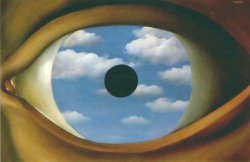Difference between revisions of "Five eyes"
Jump to navigation
Jump to search
m (1 revision: Robo 2.48 15 septmeber replacetext) |
|||
| Line 1: | Line 1: | ||
[[File:5lk.jpg|thumb|250px|]] | [[File:5lk.jpg|thumb|250px|]] | ||
| − | [[five eyes]] ([[pañca-cakṣu]], [[五眼]]). | + | <poem> |
| + | [[five eyes]] ([[pañca-cakṣu]], [[五眼]]). | ||
| + | |||
| + | |||
| + | |||
| + | 1. [[human]] [[eye]]; | ||
| + | |||
| + | 2. [[devine]] [[eye]]; | ||
| + | |||
| + | 3. [[dharma eye]]; | ||
| + | |||
| + | 4. [[wisdom eye]]; | ||
| + | |||
| + | 5. [[Buddha eye]]. | ||
These are | These are | ||
| − | :(1) the [[physical | + | :(1) the [[physical-eye]] that a [[sentient being]] is born with; |
| − | :(2) the [[god | + | :(2) the [[god-eye]] that can see anything anywhere; |
| − | :(3) the [[wisdom | + | :(3) the [[wisdom-eye]] that can see the [[emptiness]] of [[dharmas]]; |
:(4) the [[dharma-eye]] that can discriminate all [[dharmas]]; and | :(4) the [[dharma-eye]] that can discriminate all [[dharmas]]; and | ||
| − | :(5) the [[Buddha-eye]] of [[omniscience]], which includes the preceding four at the highest level (see [[three kinds of wisdom]]-[[knowledge]]). | + | :(5) the [[Buddha-eye]] of [[omniscience]], which includes the preceding four at the [[highest]] level (see [[three kinds of wisdom]]-[[knowledge]]). |
----------------------<br/> | ----------------------<br/> | ||
[[File:Eye.png|thumb|250px|]] | [[File:Eye.png|thumb|250px|]] | ||
| − | The five kinds of [[vision]], or literally “[[five eyes]]” (Skt. [[pañcacakṣu]]; Tib. [[chen nga]]; Wyl. [[spyan lnga]]) are: | + | The five kinds of [[vision]], or literally “[[five eyes]]” (Skt. [[pañcacakṣu]]; Tib. [[chen nga]]; [[Wyl.]] [[spyan lnga]]) are: |
| + | |||
| + | # the [[eye of flesh]] (Skt. [[māṃsacakṣu]]; [[Wyl.]] [[sha’i spyan]]), which refers to an [[eye]] {{Wiki|faculty}} developed through the force of one’s [[merit]], having the ability to see all [[forms]], gross or {{Wiki|subtle}}, from one hundred leagues through to the limits of the three thousand-fold [[universe]]; | ||
| + | |||
| + | # the [[divine eye]] (Skt. [[divyacakṣu]]; [[Wyl.]] [[lha’i spyan]]), which is the effortless ability to see the [[births]] and [[deaths]] of all [[beings]] and is a result of the practice of [[meditation]] in {{Wiki|past}} [[lives]]; | ||
| + | |||
| + | # the [[wisdom eye]] (Skt. [[prajñācakṣu]]; [[Wyl.]] [[shes rab kyi spyan]]), which sees the [[truth]] of [[dharmata]]; | ||
| + | |||
| + | # the [[Dharma eye]] (Skt. [[dharmacakṣu]]; [[Wyl.]] [[chos kyi spyan]]), which is the [[knowledge]] of the [[Dharma]] of [[scripture]] (or [[transmission]]) and [[realization]], and of the [[faculties]] of [[noble]] [[beings]] who possess this [[Dharma]]; | ||
| − | # the [[eye]] | + | # the [[Buddha eye]] (Skt. [[buddhacakṣu]]; [[Wyl.]] [[ye shes kyi spyan]]), which is the [[primordial wisdom]] ([[yeshé]]) that sees all aspects of everything that can be known. |
| − | + | </poem> | |
| − | |||
| − | |||
| − | |||
{{R}} | {{R}} | ||
[http://www.sutrasmantras.info/glossary.html#aggregate www.sutrasmantras.info]<br/> | [http://www.sutrasmantras.info/glossary.html#aggregate www.sutrasmantras.info]<br/> | ||
Revision as of 10:46, 20 February 2014
five eyes (pañca-cakṣu, 五眼).
1. human eye;
2. devine eye;
3. dharma eye;
4. wisdom eye;
5. Buddha eye.
These are
(1) the physical-eye that a sentient being is born with;
(2) the god-eye that can see anything anywhere;
(3) the wisdom-eye that can see the emptiness of dharmas;
(4) the dharma-eye that can discriminate all dharmas; and
(5) the Buddha-eye of omniscience, which includes the preceding four at the highest level (see three kinds of wisdom-knowledge).
The five kinds of vision, or literally “five eyes” (Skt. pañcacakṣu; Tib. chen nga; Wyl. spyan lnga) are:
- the eye of flesh (Skt. māṃsacakṣu; Wyl. sha’i spyan), which refers to an eye faculty developed through the force of one’s merit, having the ability to see all forms, gross or subtle, from one hundred leagues through to the limits of the three thousand-fold universe;
- the divine eye (Skt. divyacakṣu; Wyl. lha’i spyan), which is the effortless ability to see the births and deaths of all beings and is a result of the practice of meditation in past lives;
- the wisdom eye (Skt. prajñācakṣu; Wyl. shes rab kyi spyan), which sees the truth of dharmata;
- the Dharma eye (Skt. dharmacakṣu; Wyl. chos kyi spyan), which is the knowledge of the Dharma of scripture (or transmission) and realization, and of the faculties of noble beings who possess this Dharma;
- the Buddha eye (Skt. buddhacakṣu; Wyl. ye shes kyi spyan), which is the primordial wisdom (yeshé) that sees all aspects of everything that can be known.

